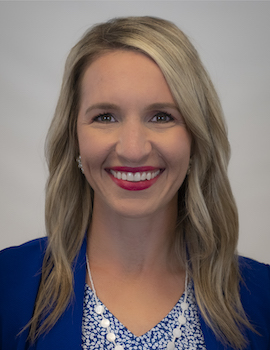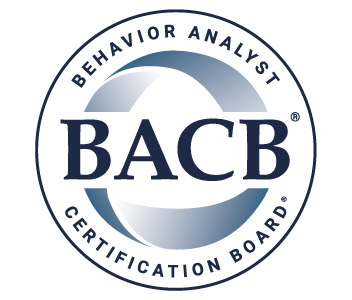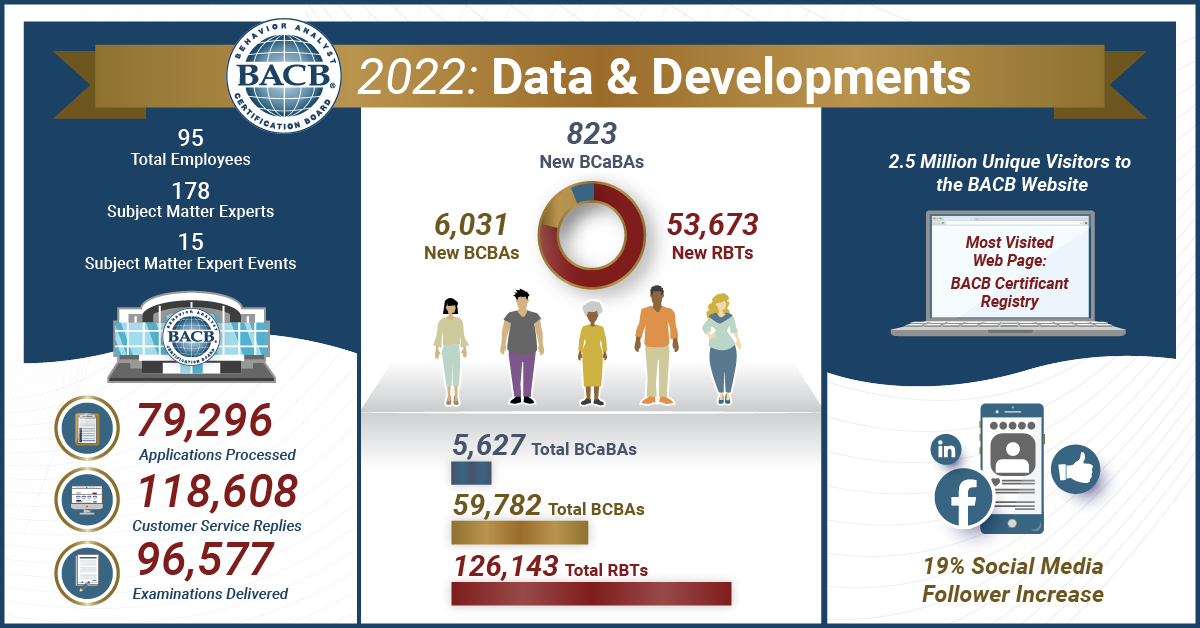New year, new data. Review this collection of important BACB milestones in 2022, and remember—we couldn’t have done it without you. Here’s to another bright year ahead.
Author: BACB NEWS
Now Available: 2021 BCBA and BCaBA Examination Pass Rates for Verified Course Sequences
The BACB has compiled 2021 pass rates for first-time BCBA and BCaBA examination candidates in university training programs with ABAI Verified Course Sequences. The data are sorted alphabetically by university, by the percentage of passing candidates, and by the volume of candidates from a given program.
PsycInfo Database Now Available to BCBAs and BCaBAs
We recently added the PsycInfo database to the ProQuest search engine available to BCBAs and BCaBAs through the Resources tab in their BACB accounts. In addition to the ERIC database, ProQuest now pulls from PsycInfo, the most comprehensive database for psychology and behavioral sciences. BCBAs and BCaBAs can now more effectively search for literature on a particular topic.
5 Must-Know RBT Application Tips

Whether you’re submitting an RBT Initial Certification Application or completing your annual RBT Renewal Application, we understand that time is of the essence. We want you to have all of the information you need for a quick and painless application experience. That way, you’ll feel well-equipped to move forward with your application and to achieve your goals as an RBT.
So, before you click Submit, read ahead for tips on getting started, creating and/or maintaining your BACB account, thoroughly reviewing your documentation, and understanding the key differences between an RBT Initial Certification Application and an RBT Renewal Application.
Tip #1: Consult the RBT Handbook
For all RBT applicants, new or renewing, the RBT Handbook should be your go-to resource. In it, you’ll find helpful information about eligibility requirements, the application process, and requirements for renewing your RBT certification. We also suggest reviewing the handbook with your RBT Supervisor or RBT Requirements Coordinator, as they can help answer any questions you might have.
Tip #2: Give yourself enough time to prepare
This is vital! Because there are many moving parts in the application process, giving yourself ample time to prepare is one of the best things you can do. If you plan accordingly, you’ll have all the time you need to carefully review your materials, which may prevent application errors that cause processing delays beyond the standard 2-week timeline. This is especially important if you’re submitting an RBT Renewal Application. For specifics, check out the following application timelines:
Wondering when you’ll hear back about your application? You can see current application processing times on the Application Processing Updates web page.
Tip #3: Create and/or maintain you BACB account
Your BACB account is the doorway to your certification, and that certification belongs to you and only you. That said, here are a few things to keep in mind when creating and/or maintaining your BACB account:
- Create your BACB account yourself. Don’t have anyone, including your future RBT Supervisor or employer, create your account on your behalf.
- Don’t use your work or school email address when signing up. If you use your work or school email address to sign up, you may lose access to your BACB account if you lose access to that email address in the future. It’s always best to sign up using a personal email address.
- Reach out to the BACB for assistance. If you lose access to your account for any reason, let us know through the Contact Us Form, and we’ll help you access your existing account. Please do not create a new account.
- Keep all of your information current. If your address, name, or other personal information changes, be sure to update your account right away.
- Add bacb.com to your email contacts and list of safe senders. This way, you can ensure that you’ll receive important messages. Also, be sure to check your spam folder periodically, especially if you’re waiting to hear from us.
Tip #4: Carefully review your documentation
When you’re eager to submit an application, it’s easy to accidentally forget a key piece, like a document, attestation, or signature. The problem is that a missing piece can make the application process not-so-easy. If documentation is missing, incorrect, or does not indicate that you meet the necessary requirements, you’ll experience delays in processing times, as the review process starts over each time you resubmit.
To avoid delays as best you can, consider reaching out to your current or future RBT Supervisor or RBT Requirements Coordinator for additional support—and make sure to review these essential documentation requirements:
| RBT Initial Certification Application | RBT Renewal Application |
|---|---|
|
|
| Note: If the documentation that shows you have met the education requirements is in a language other than English, it must be translated into English using an official translation service. | Note: There are 2 versions of the competency assessment. Please refer to the label at the top of the document to ensure that you’re using the correct one. Initial Competency Assessments will not be accepted for a renewal application, as Renewal Competency Assessments require the completion of 5 tasks instead of 3. |
Tip #5: Sit back and relax
When it comes to submitting an RBT Initial Certification Application or RBT Renewal Application, we understand how important it is for you to get an approval as soon as possible so that you can take the next steps in your RBT journey. By following this guidance and enlisting the help of your supervisor, you’ll feel confident that you can submit an approvable application in no time. And don’t forget—we’re rooting for you!
Thank you for taking the time to check out these pointers. For more RBT-related resources, visit our Registered Behavior Technician web page. For questions, please reach out via the Contact Us Form.
James E. Carr, PhD, BCBA-D, ICE-CCP

James E. Carr, PhD, BCBA-D, ICE-CCP
James E. Carr, PhD, BCBA-D, ICE-CCP is the Chief Executive Officer of the Behavior Analyst Certification Board. His professional interests include behavior analyst credentialing, practitioner training, behavioral assessment and treatment of developmental disabilities, and verbal behavior. Dr. Carr has published over 150 journal articles on these and other topics and his work has been cited over 8,000 times. Dr. Carr is a Fellow of the Association for Behavior Analysis International and has received awards from APBA, APA’s Division 25, and Autism Speaks.
SungWoo Kahng, PhD, BCBA-D

SungWoo Kahng, PhD, BCBA-D
President | New Brunswick, NJ
(term ends August 2024)
Dr. SungWoo Kahng is Chair of the Department of Applied Psychology, Director of Academic Programs in Autism and ABA, and Professor at Rutgers University. Prior to his current position, he was an associate professor at the University of Missouri (MU) where he was also the chair of the Department of Health Psychology, the Founding Director the MU Graduate Programs in Applied Behavior Analysis, and Director of the Applied Behavioral Intervention Service of the MU Thompson Center for Autism and Neurodevelopmental Disorders.
Chrissy McNair

Chrissy McNair
Vice President | Consumer Representative | Portland, OR
(term ends August 2027)
Chrissy McNair is a Neurodiversity and Developmental Disabilities Advocate and Consultant specializing in the areas of DEI, accessibility, strategic planning and public policy advocacy. She is mother to three boys, one of whom is a young adult on the Autism Spectrum. Chrissy has served on boards and committees, including Autism Living (Columbus, OH) The Autism Society of Nebraska, FEAT of Nebraska, The Munroe Meyer Institute’s Autism Center Strategic Planning Committee, the CDC’s State Act Early Team, and is currently the Board Chair for PHAME, a performing arts school for adults with developmental disabilities located in Portland, OR.
Breanne Hartley, PhD, BCBA-D

Breanne Hartley, PhD, BCBA-D
Treasurer | Noblesville, IN
(term ends August 2025)
Breanne Hartley, Ph.D., BCBA-D earned her doctorate in Behavior Analysis from Western Michigan University in 2009 and has 20 years of experience working with patients on the autism spectrum and their families. She is passionate about integrating behavior analysis and healthcare for the optimal benefit of individuals with autism.
Julie Koudys, PhD, CPsych, BCBA-D

Julie Koudys, PhD, CPsych, BCBA-D
Secretary | International Representative | Ontario, Canada
(term ends August 2027)
Julie Koudys is an Assistant Professor and Clinical Coordinator in the Department of Applied Disability Studies at Brock University, Ontario, Canada (Canada’s largest face-to-face Verified Course Sequence). She completed her Ph.D. in Clinical Psychology at York University, Toronto, Ontario. She is a Board Certified Behaviour Analyst and a Registered Psychologist. She has worked with children and youth with ASD, developmental disabilities, learning disorders, and mental health challenges for approximately 20 years.
Her primary research interests include exploring the impact of treatment fidelity and instructional strategies on the communicative behaviour of people who use augmentative and alternative communication systems, evaluating in-home behavioural parent training to treat sleep challenges and problem behaviour, and exploring long-term outcomes of youth who previously received intensive behavioural intervention. She is passionate about the integration of research into practice and partners with community providers to support clinical research and evidence-based practice.
Sadie Anderson, RBT

Sadie Anderson, RBT
RBT Representative | Knoxville, TN
(term ends August 2027)
Sadie Anderson is currently an RBT at Spectrum Specialists LLC. in Knoxville, TN. She brings 15 years of professional experience as a behavior technician to the BACB’s Board of Directors and has also served as a consumer advocate for Applied Behavior Analysis (ABA) services in the capacity of a big sister. Sadie was introduced to ABA when her younger brother began receiving ABA services in 2005.

